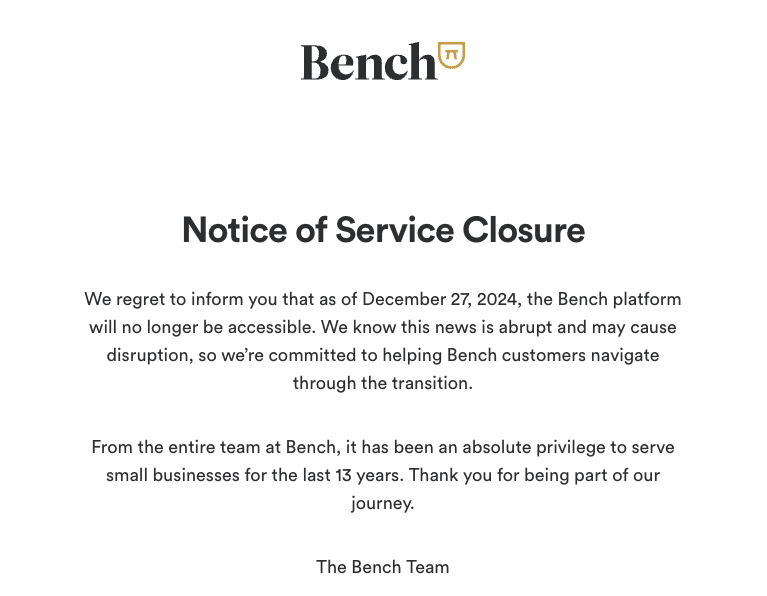Imagine waking up a few days after Christmas, toddlers running around your house, tripping on toys, and thinking only about coffee. You take your first sip, open the headlines on your phone, and discover your largest competitor suddenly ceased operations.
That happened to me last week, and I nearly spat my coffee out.
Bench’s recent and unexpected closure, once a dominant force in the outsourced bookkeeping industry, has sent shockwaves through my industry. Despite securing over $100 million in venture capital and employing over 600 individuals, Bench abruptly and inexplicably ceased operations on December 27, 2024, leaving thousands of small business clients scrambling for alternatives.
(Bench has subsequently been purchased and re-opened by Employer.com, although the company’s and its employees’ future remains somewhat uncertain.)
My company, by contrast, has never raised outside capital and has only 25 employees. For years, we have struggled to compete with Bench’s war chest as they invested millions into digital marketing, crowding out small firms like us.
But four days before year-end – the busiest time of year for accounting firms – they ran out of cash and ceased operations.
It’s as though Walmart went out of business, and I’m a small-town retailer.
How did such a large and reputable competitor suddenly fail? I do not know the details of Bench’s financial problems, but I have seen other “successful” VC startups fail and fold in 2024.
Here’s how it happens.
The Illusion of Security in Venture Capital
Venture capital often appears as a golden ticket to rapid growth and market dominance. For example, Bench ranked #1 in accounting SEO thanks to its professional marketing department.
However, Bench’s downfall shows that an infusion of capital without disciplined financial management can lead to unsustainable growth and inefficient operations. Bench’s rapid expansion, fueled by significant funding, may have led to overextension and operational inefficiencies, culminating in its sudden shutdown.
You’ve heard these stories before. Consider how WeWork seemed unstoppable for years before its IPO failure prompted a reality check. Perhaps you’ve seen your local co-working space outcompete WeWork through slower and more disciplined growth strategies.
VC: The right strategy at the wrong time.
However, more than unsustainable growth, most VC failures in 2024 simply had bad timing.
Venture Capital comes with an expectation of rapid, high-risk growth that catapults a business from one tier of financial markets to the next as it grows and disks. It’s a great strategy when the business is disruptive, and financial markets are highly liquid, such as in the frothy decade of 2010-2020. During this time, even many mediocre vaporware companies can thrive and appear successful (think: Theranos.)
The good times end when financial markets become less liquid, such as when the Federal Reserve raises interest rates. That’s when startups struggle to secure the next round of funding. It’s like musical chairs – except the number of chairs available is based on the Federal Funds Rate.
That’s when a bootstrapped boutique firm like CFO Share outcompetes Bench’s $100M in funding.
Winning in the tight capital market
Small businesses and startups that survive tight capital markets have a few common characteristics:
- Positive Cash Flow Management: Prioritizing cash flow when capital costs rise rather than relying on external funding.
- Prudent Growth Strategies: Scaling operations in alignment with market demand and internal capabilities, avoiding the pitfalls of overexpansion.
- Maintain Financial Contingencies: Relying on one source of funding (equity, debt, or profits) creates a single point of failure. Successful small businesses keep all sources of capital available in case of emergencies.
The VC Outlook for 2025
With the Fed lowering interest rates, will VC liquidity return? Did Bench mistime their next funding round by a mere 6-12 months?
Nobody knows what the future holds, but Bench Accounting’s downfall serves as a cautionary tale about the perils of overexpansion and reliance on external funding. While venture capital can be an excellent capital source during strong capital markets, startups must be cautious during a slowdown and set up contingencies.
Ultimately, sustainable success is built on a foundation of sound financial practices and strategic foresight.




